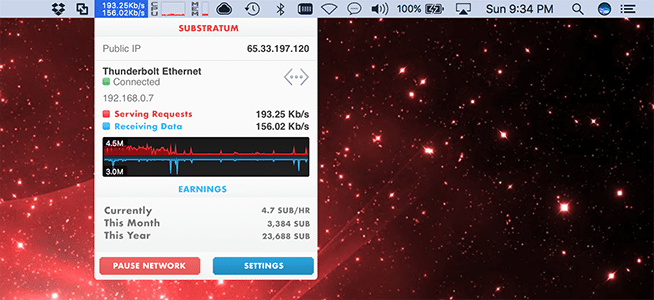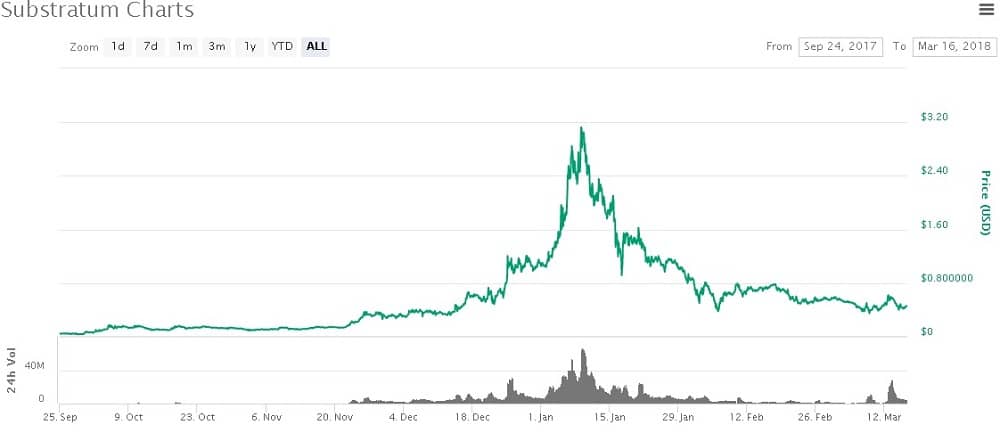Centralisation is not just a factor in the financial system. It also plays out quite regularly in the World Wide Web.
This is the case when it comes to both the access of information as well as website hosting. These centralizing factors can impact on the long term health of the internet and make it less impartial and accessible.
That is where Substratum comes in. The company wants to make the web decentralized by being large open source network where anyone can rent out their computers as hosting providers. The company wants to shake up the "client-server" model that has become the backbone of the web.
Instead of a number of people connecting to large centralised web hosts, they can connect to a network that is run on millions of individual nodes (computers). Instead of using proprietary software for the server machines, they will make use of open source code on a blockchain.
Quite simply, Substratum is trying make the internet freer for everyone. Let’s take a closer look into the project.
Overview of Substratum
What Substratum is trying to achieve is to give all of those who are connected to the network the opportunity to become their very own web hosts. They are the "nodes" that form part of the broader decentralised network.
If you wanted to become a host on the Substratum network, all you would have to do is download the latest Substratum software. This is open source meaning that anyone can download the code and work on it themselves.
Once you have downloaded the software, you can launch it and you start syncing with the broader network. What it is allowing you to do is to essentially run your own server which will connect with the other computers on the network. Other users can then access the internet and the content that you are collectively hosting.
In return for offering up your PC as a decentralised host, you will be rewarded with the Substratum tokens (Substrate). These payouts are determined based on how much you have devoted to the network. This includes things such as bandwidth and the CPU power.
Perhaps one of the most interesting things about the Substratum network is that it allows the user to tailor their hosting. They can determine how much they want to contribute in terms of resources as well as when they would like their hosts to be active.
 Screenshot of Substratum Software. Image via Medium.com
Screenshot of Substratum Software. Image via Medium.comApart from traditional hosting services, Substratum also wants to give websites the opportunity to use their CryptoPay function. This will allow these sites to process payments for goods and services using a range of different cryptocurrencies.
This creates a number of synergies between the two ecosystems of decentralised Peer-to-Peer cryptocurrency and a P2P website hosting network.
How users Connect
On the other side of the coin, there may be those users who want to "surf the web" on the decentralised substratum network. It will work much in the same was as the internet does now currently.
You will connect to the substratum network and you will enter your desired domain. The Substratum protocol will do a Domain Name System (DNS) and will use advanced technology to direct you to the host machine that is closest to you geographically.
This also makes the Substratum network that much easier to use mainly because it can easily interact with your traditional web browsing software such as Chrome and Firefox.
The Benefits of Substratum
There are a number of risks that one runs when connecting to a centralized server. The most relevant of these risks is that there is a central point of failure. There is one web host that can become an easy target for authorities and hackers.
There is one central server that can easily track your movements and record exactly what you are doing on the network. This throws up important considerations for user privacy and security.
Substratum is firstly decentralized and secondly encrypted. This means that users can freely browse the network without having to make use of privacy enhancing software such as VPNs and proxy servers. It also means that bad actors cannot infiltrate it even if they wanted to.
Apart from the security enhancing benefits of the network, there are also numerous cost advantages to using the Substratum network for hosting. This is because of the way in which webmasters are charged for the hosting of their sites.
Traditional hosting services will make use of a monthly billing model. You will get charged a flat rate based on a particular hosting plan. Irrespective of the amount that you use, you will pay this monthly subscription.
On the other hand, with the Substratum network, you will be charged based on the amount of data that has been transferred for your particular site. This is a similar model to that of some cloud CDN services that will charge based on the amount of GET requests that are sent to the server.
Internet Freedoms Entrenched
While privacy online is a very important consideration for many people, there are others who have to fear the consequences of repressive regimes. It is well known that in countries such as China and Iran, Internet activity is heavily monitored.
The governments try to restrict what content their citizens are able to access and what discussions they are able to have. For example, in China there is something called the "Great firewall". This is essentially a large network firewall that surrounds the whole country and controls what can be accessed.
Using the Substratum network, however, can circumvent this. The entire network is encrypted and the only thing that the government controllers will be able to see is a connection to a decentralised network. There is no way of them monitoring what you do or where you visit.
Internet freedom is not only something that people in authoritarian countries have to worry about. For example, the move last year by the SEC to end Net Neutrality could have numerous implications for those citizens who are based in the USA.
Essentially, the ruling implies that the internet service providers can charge different rates for those who wish to access different content and websites. Hence, the ISPs can selectively throttle your access based on the sites that you choose to access.
Connecting to a decentralised network that splits access points and encrypts traffic means that your ISP will have no idea what sites you are accessing. You will be free to browse the internet as if Net Neutrality was still in place.
Strong Team Members
Taking a look at those who are in charge of Substratum should provide users with an added sense of confidence. The Substratum team members have diverse backgrounds in fields of tech and business.
 Co-Founders of Substratum. Image via substratum.net
Co-Founders of Substratum. Image via substratum.netAs can be seen in the above image, the three co-founders have over 50 years of industry experience working with companies such as Apple, HP, Facebook and a number of other Fortune 500 clients. Having a strong team is no doubt a great asset that is often helpful in separating a crowded startup market.
Potential Challenges for Substratum
Although the idea of Substratum is no doubt intriguing, there are a number of other blockchain based projects that offer a similar concept and have been in circulation for a longer period of time.
For example, you have Golem (GNT) which is making use of the Ethereum network to build a large decentralised virtual super computer. You also have cloud storage based projects such as Filecoin that are also about to come online with extensive ICO funds backing them.
It is also less clear that there will be a great incentive for participants to host on the Substratum network. For example, hosting will require the resources of the PC in the form of CPU power and storage. Mining cryptocurrency is similar and uses GPUs for Proof-of-Work algorithms or the hard drive for Proof-of-Capacity protocols.
Hence, the host will have to decide which is more lucrative. Either they can offer up their PC for hosting to earn Substrate or they can turn their computing power onto mining crytpocurrencies. If hosting Substratum is not much less resource intensive or much more lucrative, it is unlikely to get many hosts on board.
The Substrate Tokens (SUB)
Substrate is an ERC20 token that people could have purchase initially through an ICO. This was held between August and September last year where the project was able to raise about $13.8m.
Although this was below their target of $45m, it is still a substantial sum which the developers are no doubt going to be putting to good use. The SUB tokens are currently trading at $0.454. This can be seen in the graph below
 Substratum Price Performance. Image via coinmarketcap.com
Substratum Price Performance. Image via coinmarketcap.comThe price of the tokens has fallen considerably over the past few weeks which is in line with the general cryptocurrency markets. The SUB tokens are still up considerably from the ICO token price of about $0.08.
You can purchase SUB tokens on exchanges such as KuCoin, EtherDelta and Binance. Once you have got your coins, you can store them on any ERC20 compatible hardware wallet or web based wallet such as My Ether Wallet (MEW).
Future Prospects for Substratum
The idea behind Substratum does indeed have the potential to change the way that we think about access to information in a digital age. There has been too much power placed into the hands of centralised web hosts at the expense of users.
Substratum is helping to achieve those ends by creating a truly decentralized internet where users are able to benefit from spare computing power of their neighbors next door. It empowers those nodes that want to become their own hosts. It also allows them a chance to earn extra income.
There are of course challenges that Substratum has to overcome. There are strong competitors and the cryptocurrency market is currently going through some choppy conditions. They will also have to think of a way to properly incentivize hosts to use Substratum over regular cryptocurrency mining.
Nevertheless, Substratum is a project that deserves your attention. We will keep a close eye on the project to see how it develops over the coming months.



